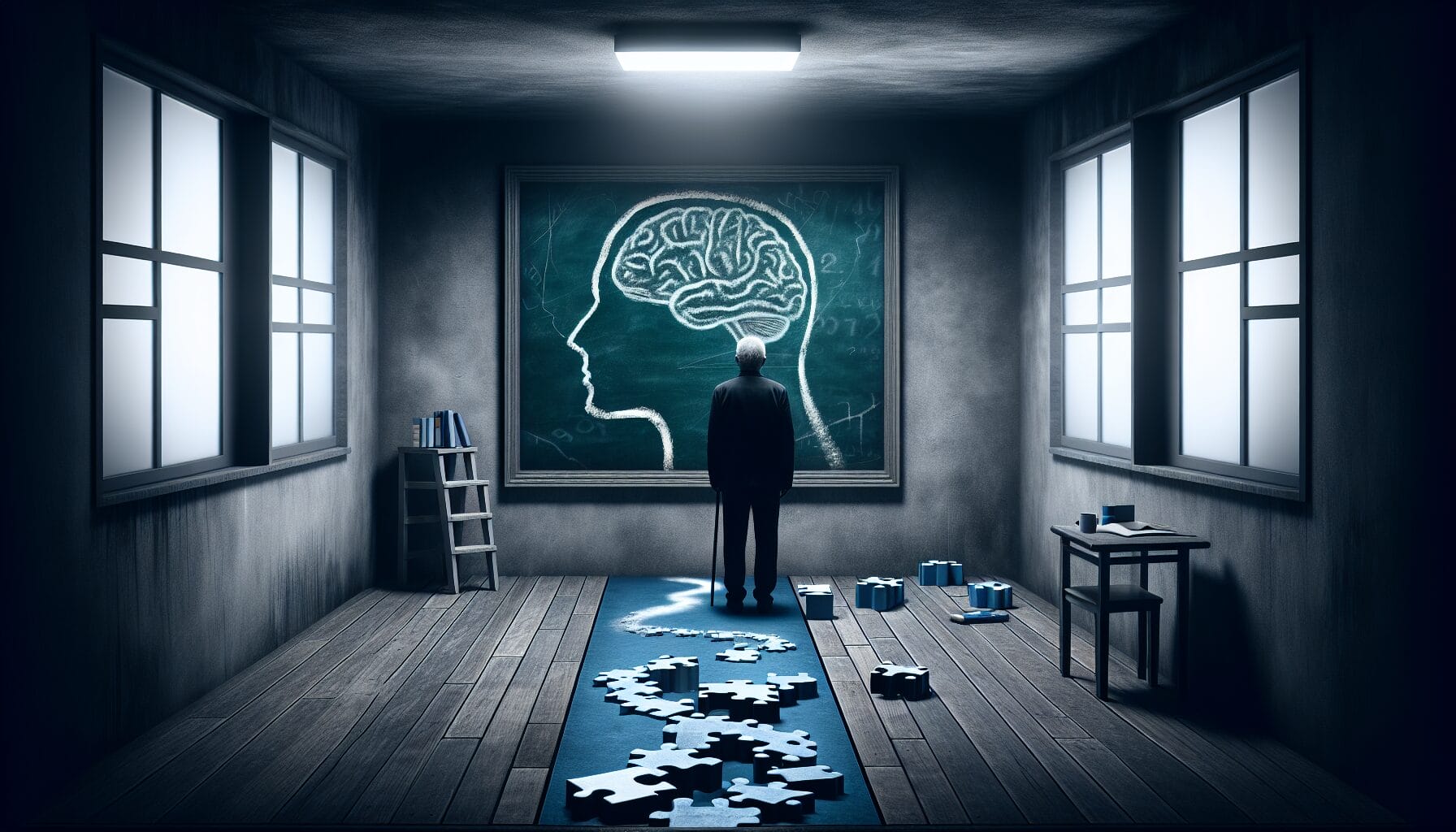What are the stages of dementia? This key question prompts a journey through the progressively intensifying levels of cognitive decline. Initially displaying mild symptoms, dementia evolves into a condition requiring comprehensive care. Our concise guide explains these stages with clarity, easing the understanding essential for patients and caregivers alike.
Article Preview
Dementia progresses through three main stages: early (mild), middle (moderate), and late (severe), each with increasing levels of cognitive decline and care needs.
Factors such as genetics, metabolic conditions like diabetes, and neuropsychiatric symptoms influence the rate and progression of dementia, highlighting the importance of early detection and management.
Support for caregivers and people with dementia is essential, including coping strategies, self-care practices, and leveraging resources from organizations like the Alzheimer’s Association for better disease management and quality of life.
Understanding the Three Stages of Dementia

Dementia, a condition characterized by a decline in cognitive function, is not a singular entity but a spectrum of symptoms that evolve over time. As this disease progresses through its course, it manifests in three distinct stages—early, middle, and late. With dementia progressing, grasping the nuances of each stage can significantly enhance the quality of life for those navigating this challenging journey.
The framework provided by these stages is essential, yet one must remember that the individual experience varies, painting a unique picture for each person’s dementia.
Mild Dementia (Early Stage)
The onset of dementia often begins subtly, marked by mild dementia where memory lapses become more frequent and names or recent events slip just beyond reach. In this early stage, individuals grapple with daily tasks, yet retain the ability to partake in familiar activities such as driving and working, even as they face challenges in planning and organizing due to the person’s dementia.
The subtlety of these early stages symptoms, particularly in the early stage, underscores the importance of attentive observation by loved ones and healthcare professionals to ensure early detection and timely intervention.
Moderate Dementia (Middle Stage)
As dementia people advance into the middle stage of moderate Alzheimer’s disease, their world becomes increasingly muddled. Words once easily retrieved now elude them, and once-familiar faces may seem like strangers. The moderate stage ushers in a need for more support, as even simple tasks like dressing or managing finances become arduous without assistance. As they approach the final stage, the challenges and support required will continue to increase.
It is during this moderately severe decline that the reality of full-time care comes into view, underscoring the escalating needs as cognitive capacities wane.
Severe Dementia (Late Stage)
In the late stages of Alzheimer’s disease, the curtain falls on the mind’s theater, leaving individuals in a state of severe decline. The ability to engage with the environment, communicate, and even control movement slips away as Alzheimer disease progresses into its final stages. With the person losing their independence, 24-hour care becomes indispensable to ensure comfort and dignity.
Palliative care, respecting the individual’s wishes, becomes the cornerstone of late-stage support, focusing on providing a serene end-of-life experience.
Preclinical Alzheimer’s Disease: The Silent Stage

The journey through Alzheimer’s stages begins long before the first signs of memory loss manifest. This silent stage, known as preclinical Alzheimer’s disease, is a frontier largely explored in research settings where early detection holds the promise of altering the disease’s trajectory. Cutting-edge imaging technologies and blood biomarkers now allow us to glimpse the amyloid plaques and neurofibrillary tangles that signal forthcoming cognitive decline, even when outward symptoms are yet to be seen. In this context, identifying early stage Alzheimer cases becomes crucial for timely intervention and treatment.
Mild Cognitive Impairment: A Precursor to Dementia

Mild cognitive impairment stands at the crossroads between normal aging and the more serious decline of dementia, such as mild Alzheimer’s disease. It presents a window of opportunity, where changes in memory and thinking ability become noticeable, and the risk of progression to Alzheimer’s disease looms larger.
For those diagnosed, the reality is that the annual progression rate from MCI to dementia is significantly higher than in those with normal cognition—a clarion call for vigilant monitoring and proactive management.
The Brain’s Journey from Initial to Moderate Alzheimer’s Disease
The transition from initial to moderate Alzheimer’s disease is marked by significant changes in the brain. In the initial phase, amyloid plaques begin to form between neurons, disrupting cell-to-cell communication. These plaques are protein fragments that the body normally eliminates, but in Alzheimer’s, they accumulate to form hard, insoluble plaques.
Simultaneously, tau proteins inside neurons start to build up into neurofibrillary tangles, which block the neuron’s transport system, causing essential nutrients and other supplies to reach the cells. This results in loss of neuron function and even death.
As the disease progresses toward the moderate stage, these biological disruptions spread to areas of the brain involved in language, reasoning, and conscious thought. Brain scans reveal a shrinking cortex, the outer layer responsible for memory and thinking, and a declining hippocampus, which is critical for the formation of new memories. This widespread neuronal damage leads to the symptoms becoming more pronounced and interfering with day-to-day life, signaling the advance into moderate Alzheimer’s disease.
Factors Influencing Dementia Progression
Dementia’s progression is not solely at the mercy of time; it is influenced by a tapestry of factors, including genetics, with the APOE ε4 allele being a notorious harbinger of Alzheimer-type dementia. The presence of diabetes and prediabetes also casts a shadow on the journey from MCI to dementia, underscoring the importance of managing these conditions to potentially curb the disease’s progression.
Meanwhile, neuropsychiatric dementia symptoms such as hallucinations or nighttime behaviors serve as harbingers, indicating a higher risk of developing dementia.
Coping Strategies for People Living with Dementia
The daily life of a person living with dementia can be replete with challenges, yet there are strategies to make life easier. Here are some strategies to consider:
Establish a daily routine to provide structure and familiarity.
Maintain a familiar environment to anchor individuals in a sea of forgetfulness.
Adapt the home with equipment to simplify everyday tasks.
Choose proper clothing to make dressing and grooming easier. These strategies can help preserve dignity and autonomy for individuals living with dementia.
In the midst of cognitive changes, engaging in physical and leisure activities can spark joy and maintain a connection to the world around them.
Caregiver Support and Self-Care
For caregivers, the journey alongside a family member with dementia, or even early stage alzheimer’s, is one of love, patience, and endurance. As they adapt to the evolving needs of their loved one, caregivers must not neglect their well-being, practicing self-care to sustain their capacity to provide support. Joining support groups, seeking respite care, and staying connected with close friends and family can help mitigate the stress and isolation that often accompany caregiving. This is often where we see the greatest value from a home care agency; not only does your loved one continue to get loving care, but you, as the caregiver, get some much-needed help. At 2nd Family, our approach to senior care provides you the chance to get the right amount of help when you need it.

Early discussions about healthcare directives and future planning are crucial steps to ensure that both the caregiver and the person with dementia are respected and prepared for the road ahead.
Resources and Assistance from Alzheimer’s Organizations
Navigating the complexities of dementia is not a journey to undertake alone. Alzheimer’s organizations are beacons of hope, providing educational resources, support services, and assistance to those in need. By understanding the personal experiences of those affected and offering more help, these organizations create a community of support that empowers individuals and their caregivers to manage the condition with greater efficacy.
It is clear that while the stages of dementia present a heart-wrenching progression, knowledge and support can light the way. Agencies such as the Alzheimer’s Association do wonderful work and provide a tremendous resource point for families experiencing anything from a mild decline in cognitive performance to more severe form of the disease. From the silent whispers of preclinical Alzheimer’s to the final bow in the late stages, understanding the disease and employing effective coping strategies can transform the journey into one of dignity and grace.
Frequently Asked Questions
How fast does dementia progress?
Dementia can progress at varying rates, with some individuals staying in the early stages for many years and others experiencing a gradual worsening over several years. It is important to note that dementia is progressive, with symptoms worsening over time. One’s mental and physical abilities may remain intact to varying degrees as the moderate decline persists.
How long do people with dementia live for?
The average life expectancy after a dementia diagnosis is around 8 to 10 years, and it can vary from 2 to 26 years depending on individual factors. Dementia progression and life expectancy differ for each person.
What are signs that dementia is getting worse?
As dementia progresses, signs of worsening may include reduced physical state, such as weight loss, loss of mobility, incontinence, and skin infections, along with severe impairment in memory, ability to process new information, and recognizable speech. Everyday objects may cause confusion or uncertainty, and problem solving begins to become more challenging. Your loved one may begin experiencing difficulty in choosing proper clothing for the day or season. This may also involve the need for assistance with everyday activities, eating difficulties, and bowel and bladder incontinence.
What are the initial signs of mild dementia?
The initial signs of mild dementia include memory lapses, difficulties with word-finding, and challenges in planning or organizing tasks that may impact daily functioning. These signs can be indicative of the early stages of dementia. This is the stage when family members begin suspecting that something may be off, but often times don’t recognize it as the early stages of Alzheimer’s disease.
How can I support a loved one in the moderate stage of dementia?
In the moderate stage of dementia, providing additional support for daily tasks and ensuring a safe environment are crucial in helping your loved one. Considering full-time care options may also be necessary as their needs increase.